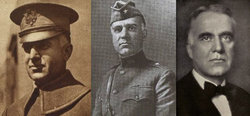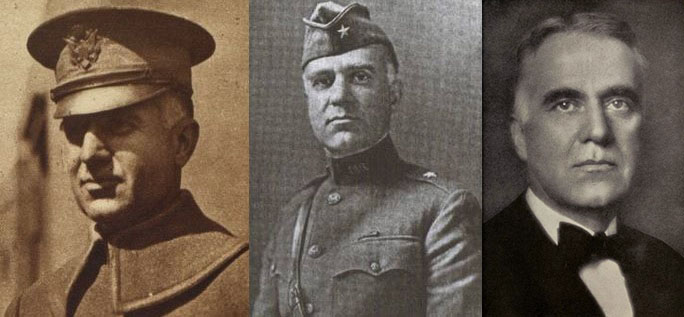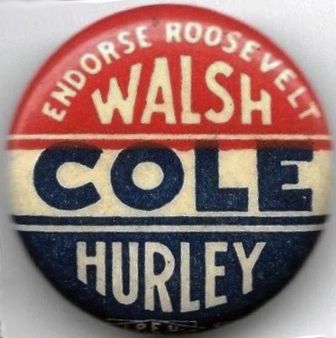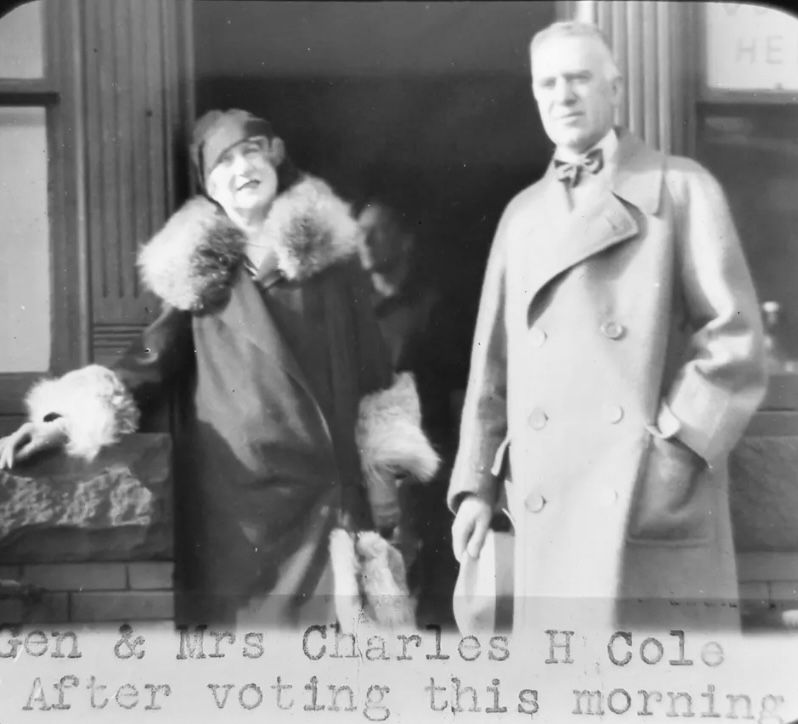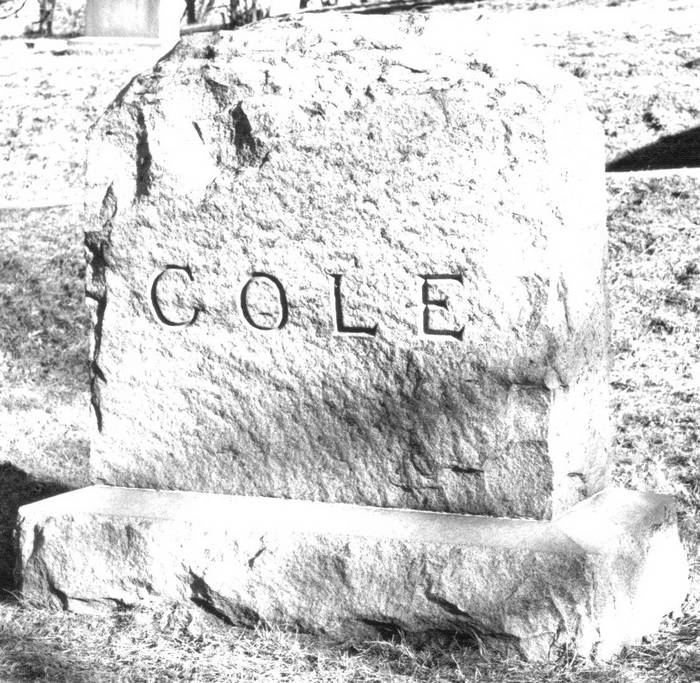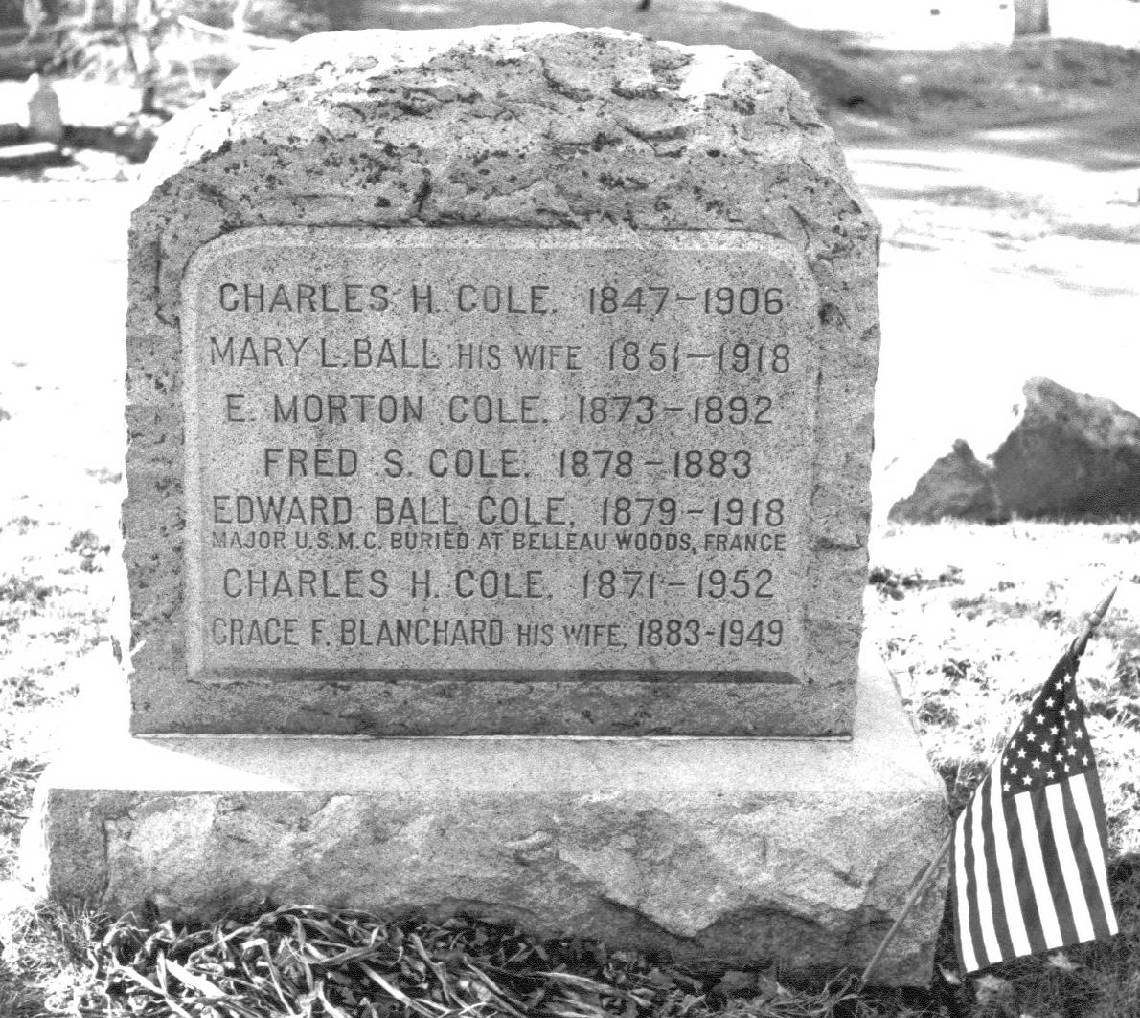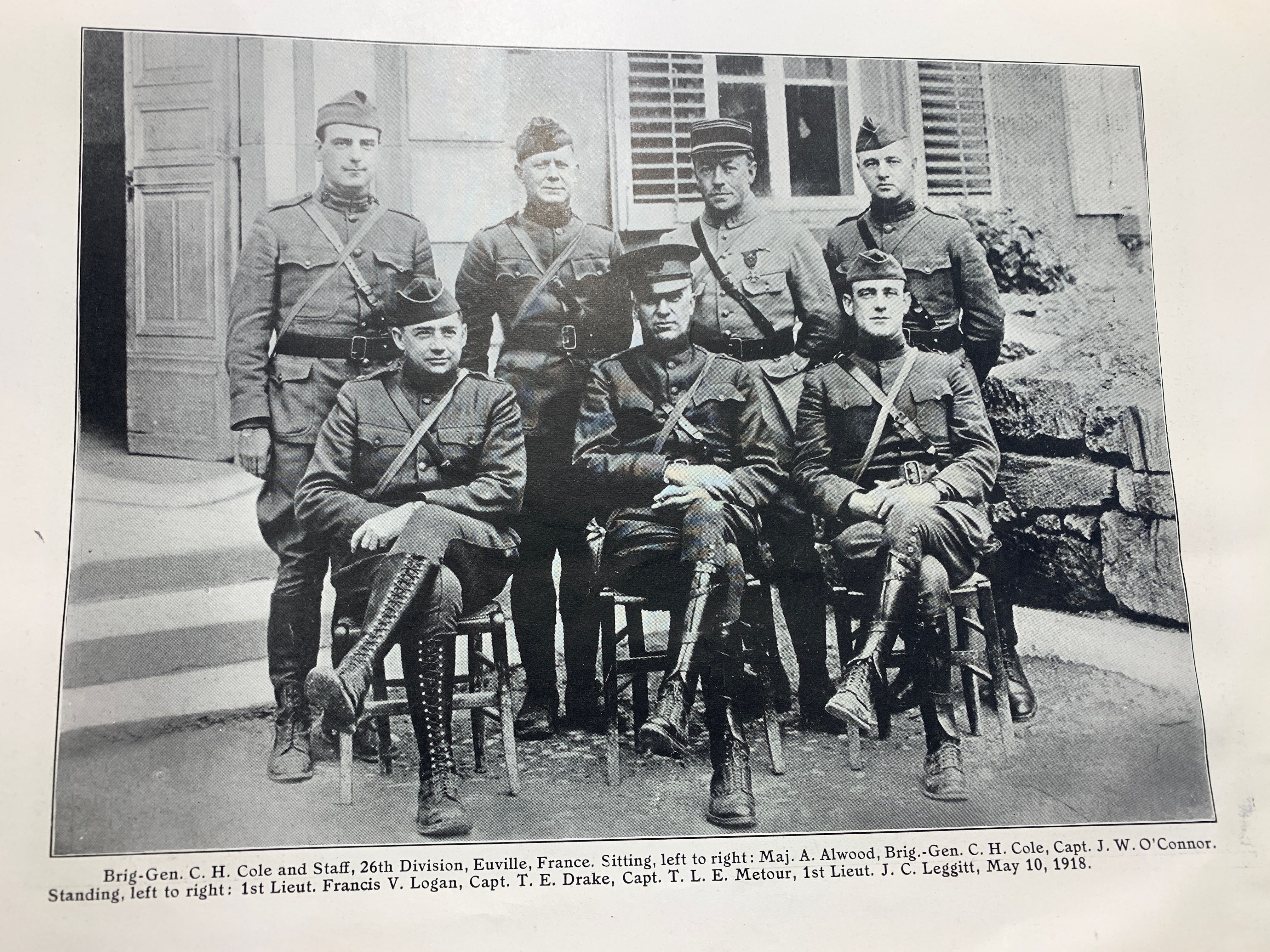Graduate of English High School in Boston, Class of 1888.
After high school, he entered the office of A.S. Bigelow, the mining engineer, and took active part in managing the Boston & Montana mine until it went into the Amalgamated.
In 1890, he joined the First Corps of Cadets as a private in Boston and Hingham and when he resigned in 1914, he held the rank of captain in Company B.
In 1901, he entered the real estate business and continued with the mining business where he served as cashier and treasurer for several mining and smelting companies in Utah and Colorado.
As 1st Lieutenant in Company B, he was part of the parade ceremony of the dedication of the Dorchester Heights Memorial in South Boston in 1902 and at the dedication of the equestrian statue of Major General Joseph Hooker at the new Massachusetts State House in 1903.
He was in command of the Massachusetts rifle team that competed in the marksmanship contest at Fort Riley, Kansas, in 1904.
Mayor Josiah Quincy appointed him Constable of the City of Boston. He served as Police Commissioner and Chairman of the Police Board where he held the rank of colonel, appointed by Governor William Douglas in 1905. While serving as Police Commissioner, he was Inspector General of rifle practice of the Massachusetts militia.
Served as Fire Commissioner (replacing Charles D. Daly who later became known as the Godfather of West Point Football), appointed by Mayor John "Honey Fitz" Fitzgerald in 1912. As Fire Commissioner, he served as president of the Boston Chapter of the National Fire Protection Association (NFPA). During the immediate aftermath of the Great Salem Fire of 1914, Governor David Walsh had him serve as his personal representative and executive where he helped to preserve order and in aiding the distressed. Adjutant General during the administrations of Governor Walsh (appointed in 1914), Governor Samuel McCall (appointed in 1916) and Governor Charles Hurley (appointed in 1936). As Chairman of the Armory Commission, he presented the keys to the Armory for the First Corps of Cadets on Columbus Avenue in Boston, to Governor Walsh, who accepted them on behalf of the Commonwealth at the dedication ceremony in 1915. In 1916 he rode with Brigadier General John "Black Jack" Pershing down to Mexico to secure the border and to pursue Francisco "Pancho" Villa. Candidate for Governor in 1916 against Frederick Mansfield in the Democratic party.
During World War I, he enlisted as a private in the Massachusetts Ninth Infantry at the old muster grounds in Framingham in April of 1917. The day following his enlistment, Colonel Edward L. Logan promoted him to the rank of captain after he aced the exam. In August of 1917, President Woodrow Wilson assigned him the rank of Brigadier General of the 52nd Infantry Brigade, where he was placed in command at Camp Bartlett in Westfield. This brigade was later to be known as the 26th "Yankee" Division (the first National Guard division to be formed for the American Expeditionary Forces (AEF)), where he served under Major General Clarence Edwards. Some of the battles in France that General Cole was engaged in were: Neufchateau, Chemin des Dames, Toul (Boucq) Sector, Champagne-Marne Defensive, Aisne-Marne Offensive and Meuse-Argonne Offensive. He had received the Victory Medal and the Cross de Guerre.
During The Boston Police Strike of 1919, Governor Calvin Coolidge and Mayor Andrew Peters put him in charge of the troops who took back control of Boston when the entire Boston police force deserted their posts. The National Guard used Faneuil Hall for their headquarters. In 1921 he was elected Commander of the Department of Massachusetts American Legion.
Delegate-at-large at Democratic National Convention in 1924 for John Davis/Charles Bryan and in 1928 for Alfred Smith/Joseph Robinson. In 1928 he defeated John Cummings for the Democratic nomination but lost to Lieutenant-Governor Frank Allen. Delegate-at-large at Democratic National Convention in 1932 for Franklin Roosevelt/John Garner. Candidate for Governor in 1934 against Mayor James Curley. He was named Adjutant General of the National Guard in 1937 and Associate Commissioner of Labor and Industries in 1938. On February 25, 1937, he and Governor Hurley attended the launching of the USS Craven (DD-382) at the Fore River Shipyard in Quincy. He was Chairman of the State Racing Commission and a Trustee of the Boston Elevated Railway Company.
Charles Cole was a member of The Algonquin Club, The Boston City Club, The Puritan Club, the Boston Athletic Association (BAA), the Boston Lodge of Elks, and a member of the Society of Sons of the Revolution in the Commonwealth of Massachusetts.
He died at Quigley Memorial Hospital in Chelsea.
Services were held at the First Unitarian Church in the Back Bay, officiated by Dr. Charles Edward Park.
He was interred at the Hingham Cemetery with military and American Legion honors coordinated by Cambridge's Watson Funeral Home. Bearers were his four Cole nephews, Morton, George, Charles, and Edward.
"General Cole was a man of honor and integrity, straightforward in all his dealings, square and just in all his motives, generous and chivalrous in all his impulses.
As a man in authority, a commander of men, he approached his responsibility with conspicuous intelligence. To him human life was never expendable. He asked of others no more than he could give himself. He held his men up to his high standard by inspiring them with the desire to meet that standard.
He was strict yet reasonable, exacting, yet considerate. Therefore, he received from them what he never had to ask, their confidence and respect.
Returning to the ways of peace, he found opportunities to serve his community for which his military experience gave him a special fitness. He was entirely unpretentious and unassuming. No hungry ambitions disturbed him. No insatiable appetites misled him. He knew himself how far he could go, when to stop.
He was content to pursue the even tenor of his way, a patriot and a soldier, an honest public servant and a true friend."
- Excerpt from General Cole's eulogy as delivered by Dr. Charles Edward Park of the First Church in Boston.
1880 U.S. Census:
https://familysearch.org/ark:/61903/3:1:33S7-9YBN-9V7N?mode=g&i=12&cc=1417683
1900 U.S. Census:
https://familysearch.org/ark:/61903/3:1:S3HT-6QX3-VHW?mode=g&i=51&cc=1325221
1910 U.S. Census:
https://familysearch.org/ark:/61903/3:1:S3HT-6QX3-VHW?mode=g&i=51&cc=1325221
1920 U.S. Census:
https://familysearch.org/ark:/61903/3:1:33SQ-GR6G-Z7J?mode=g&i=9&cc=1488411
1940 U.S. Census:
https://familysearch.org/ark:/61903/3:1:3QS7-89M1-QDTB?mode=g&i=38&cc=2000219
Graduate of English High School in Boston, Class of 1888.
After high school, he entered the office of A.S. Bigelow, the mining engineer, and took active part in managing the Boston & Montana mine until it went into the Amalgamated.
In 1890, he joined the First Corps of Cadets as a private in Boston and Hingham and when he resigned in 1914, he held the rank of captain in Company B.
In 1901, he entered the real estate business and continued with the mining business where he served as cashier and treasurer for several mining and smelting companies in Utah and Colorado.
As 1st Lieutenant in Company B, he was part of the parade ceremony of the dedication of the Dorchester Heights Memorial in South Boston in 1902 and at the dedication of the equestrian statue of Major General Joseph Hooker at the new Massachusetts State House in 1903.
He was in command of the Massachusetts rifle team that competed in the marksmanship contest at Fort Riley, Kansas, in 1904.
Mayor Josiah Quincy appointed him Constable of the City of Boston. He served as Police Commissioner and Chairman of the Police Board where he held the rank of colonel, appointed by Governor William Douglas in 1905. While serving as Police Commissioner, he was Inspector General of rifle practice of the Massachusetts militia.
Served as Fire Commissioner (replacing Charles D. Daly who later became known as the Godfather of West Point Football), appointed by Mayor John "Honey Fitz" Fitzgerald in 1912. As Fire Commissioner, he served as president of the Boston Chapter of the National Fire Protection Association (NFPA). During the immediate aftermath of the Great Salem Fire of 1914, Governor David Walsh had him serve as his personal representative and executive where he helped to preserve order and in aiding the distressed. Adjutant General during the administrations of Governor Walsh (appointed in 1914), Governor Samuel McCall (appointed in 1916) and Governor Charles Hurley (appointed in 1936). As Chairman of the Armory Commission, he presented the keys to the Armory for the First Corps of Cadets on Columbus Avenue in Boston, to Governor Walsh, who accepted them on behalf of the Commonwealth at the dedication ceremony in 1915. In 1916 he rode with Brigadier General John "Black Jack" Pershing down to Mexico to secure the border and to pursue Francisco "Pancho" Villa. Candidate for Governor in 1916 against Frederick Mansfield in the Democratic party.
During World War I, he enlisted as a private in the Massachusetts Ninth Infantry at the old muster grounds in Framingham in April of 1917. The day following his enlistment, Colonel Edward L. Logan promoted him to the rank of captain after he aced the exam. In August of 1917, President Woodrow Wilson assigned him the rank of Brigadier General of the 52nd Infantry Brigade, where he was placed in command at Camp Bartlett in Westfield. This brigade was later to be known as the 26th "Yankee" Division (the first National Guard division to be formed for the American Expeditionary Forces (AEF)), where he served under Major General Clarence Edwards. Some of the battles in France that General Cole was engaged in were: Neufchateau, Chemin des Dames, Toul (Boucq) Sector, Champagne-Marne Defensive, Aisne-Marne Offensive and Meuse-Argonne Offensive. He had received the Victory Medal and the Cross de Guerre.
During The Boston Police Strike of 1919, Governor Calvin Coolidge and Mayor Andrew Peters put him in charge of the troops who took back control of Boston when the entire Boston police force deserted their posts. The National Guard used Faneuil Hall for their headquarters. In 1921 he was elected Commander of the Department of Massachusetts American Legion.
Delegate-at-large at Democratic National Convention in 1924 for John Davis/Charles Bryan and in 1928 for Alfred Smith/Joseph Robinson. In 1928 he defeated John Cummings for the Democratic nomination but lost to Lieutenant-Governor Frank Allen. Delegate-at-large at Democratic National Convention in 1932 for Franklin Roosevelt/John Garner. Candidate for Governor in 1934 against Mayor James Curley. He was named Adjutant General of the National Guard in 1937 and Associate Commissioner of Labor and Industries in 1938. On February 25, 1937, he and Governor Hurley attended the launching of the USS Craven (DD-382) at the Fore River Shipyard in Quincy. He was Chairman of the State Racing Commission and a Trustee of the Boston Elevated Railway Company.
Charles Cole was a member of The Algonquin Club, The Boston City Club, The Puritan Club, the Boston Athletic Association (BAA), the Boston Lodge of Elks, and a member of the Society of Sons of the Revolution in the Commonwealth of Massachusetts.
He died at Quigley Memorial Hospital in Chelsea.
Services were held at the First Unitarian Church in the Back Bay, officiated by Dr. Charles Edward Park.
He was interred at the Hingham Cemetery with military and American Legion honors coordinated by Cambridge's Watson Funeral Home. Bearers were his four Cole nephews, Morton, George, Charles, and Edward.
"General Cole was a man of honor and integrity, straightforward in all his dealings, square and just in all his motives, generous and chivalrous in all his impulses.
As a man in authority, a commander of men, he approached his responsibility with conspicuous intelligence. To him human life was never expendable. He asked of others no more than he could give himself. He held his men up to his high standard by inspiring them with the desire to meet that standard.
He was strict yet reasonable, exacting, yet considerate. Therefore, he received from them what he never had to ask, their confidence and respect.
Returning to the ways of peace, he found opportunities to serve his community for which his military experience gave him a special fitness. He was entirely unpretentious and unassuming. No hungry ambitions disturbed him. No insatiable appetites misled him. He knew himself how far he could go, when to stop.
He was content to pursue the even tenor of his way, a patriot and a soldier, an honest public servant and a true friend."
- Excerpt from General Cole's eulogy as delivered by Dr. Charles Edward Park of the First Church in Boston.
1880 U.S. Census:
https://familysearch.org/ark:/61903/3:1:33S7-9YBN-9V7N?mode=g&i=12&cc=1417683
1900 U.S. Census:
https://familysearch.org/ark:/61903/3:1:S3HT-6QX3-VHW?mode=g&i=51&cc=1325221
1910 U.S. Census:
https://familysearch.org/ark:/61903/3:1:S3HT-6QX3-VHW?mode=g&i=51&cc=1325221
1920 U.S. Census:
https://familysearch.org/ark:/61903/3:1:33SQ-GR6G-Z7J?mode=g&i=9&cc=1488411
1940 U.S. Census:
https://familysearch.org/ark:/61903/3:1:3QS7-89M1-QDTB?mode=g&i=38&cc=2000219
Inscription
COLE
CHARLES H. COLE 1847‒1906
MARY L. BALL HIS WIFE 1851‒1918
E. MORTON COLE 1873‒1892
FRED S. COLE 1878 ‒ 1883
EDWARD BALL COLE 1879‒1918
MAJOR U.S.M.C. BURIED AT BELLEAU WOODS, FRANCE
CHARLES H. COLE 1871‒1952
GRACE F. BLANCHARD HIS WIFE 1883‒1949
Gravesite Details
Section F, Lot 27, Plot 6.
Family Members
Sponsored by Ancestry
Advertisement
Advertisement
